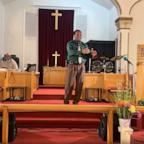Former CEO at American supports limit on tarmac delays
WASHINGTON -- A former CEO of American Airlines on Tuesday backed imposing a three-hour time limit on how long airlines can strand passengers on airport tarmacs, but he also warned of consequences.
Robert Crandall parted company with former industry colleagues and joined passengers rights advocates as they took their case to Congress. He supports legislation in the Senate that would require that passengers be allowed to get off the plane after a three-hour wait. Exceptions: If the pilot thinks it's unsafe to leave the plane or that the plane will take off in 30 minutes.
"The airline industry should have led the way in responding to this problem rather than having resisted it," Crandall said. "Every responsible airline executive I know thinks these things are an outrage."
However, he said returning passengers to terminals likely will result in more flight cancellations and modest fare increases.
Because flights are increasingly full or nearly full because of cutbacks in schedules, passengers who get off may have trouble finding seats on other planes and be delayed longer than if they had continued to wait on a runway, Crandall said.
He recommended an initial four-hour time limit to give airlines time to make adjustments before ratcheting down to a three-hour limit in 2011.
Sen. Barbara Boxer, D-Calif., co-sponsor of a "passengers bill of rights" containing the three-hour limit, rejected Crandall's suggestion. There are "a lot of folks behind the scenes who don't want this legislation," she said. "I'm going to fight for the three hours because it will get watered down. It always does."
The Air Transport Association, which represents major airlines, declined invitations to attend the hearing. The association has warned there will be more inconvenience and delay for passengers if a hard time limit is imposed.
Passengers rights advocate Kate Hanni called that assertion a "myth." She said advocates only want passengers to be given the option to get off the plane every three hours, and that doesn't require the plane to return to a gate.




